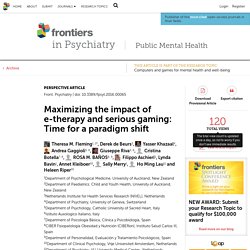

Redemption through Annihilation?! - Game Designer´s views on religion, culture and society and its influences on digital games. Redemption through Annihilation?!

- Game Designer´s views on religion, culture and society and its influences on digital games Abstract While video games have been under public observation for approximately 30 years, focus has hardly ever been put on the creators, designers, developers, or other creative staff. The “Game Developer Demographics Report” of the International Game Developers Association (IGDA) from the year 2005 was one of the very few attempts to survey game developers regarding their personal motivation and outlook on life but it explicitly excluded inquiries on religious aspects; even asking about sexual preferences caused considerable complications.
Who game designers are and what they think is however not unimportant. According to Gräb, religion certainly is not confined to churches but permeates other public spheres, the media not being the least of these. Serious Games for Personal and Social Learning & Ethics: Status and Trends. You are using an outdated version of Firefox which is not supported by ResearchGate anymore.

For a faster, safer browsing experience, upgrade your browser now. <div class="c-box-warning full-width-element" style="text-align: center; "><div style="margin: auto; padding:10px;" class="container"><b>For full functionality of ResearchGate it is necessary to enable JavaScript. Here are the <a href=" rel="nofollow" target="_blank"> instructions how to enable JavaScript in your web browser</a>.
Meediavärav. We play serious games Acknowledging the rising trend of game-based learning, Tallinn University decided to open the interdisciplinary international master’s programme called Digital Learning Games.

Creating games needs a large amount of specific knowledge. The programme offers courses from various institutes on the basis of their competences: game planning, human and computer interaction, storytelling, pedagogy and psychology. Games and pedagogy share many innovative educational methods, such as game-based learning, the design of serious games and gamification. The latter is the method of applying game-like elements to activities in other fields, e.g. education. Serious Games for Personal and Social Learning & Ethics: Status and Trends.
From Story-Telling to Educational Gaming: The Bamiyan {Valley} Case. You are using an outdated version of Firefox which is not supported by ResearchGate anymore.

For a faster, safer browsing experience, upgrade your browser now. Survey Highlights Use of Games Remains a DIY Affair. Introduction A new survey of teachers and after-school program instructors finds that most come to use digital games through their own initiative or because of a colleague who connects them to the game.

The findings highlight the degree to which educators still lack training and resources for finding and using games in the classroom. The results are part of a survey conducted by the Joan Ganz Cooney Center of educators registered with First Book, the non-profit that provides free and low-cost books and educational resources to schools and programs serving children in need. Cover Kapp web. 531568a. How a new generation of games is changing minds. Imagine you’re playing a game in which you’re in the role of a felon driving a car as you are pursued by the police.

Rather than providing different opportunities to defend yourself, the game instead gives you increasingly fewer options to escape, eventually leaving you entirely alone as the police close in. This is the premise of a new videogame called What We Did designed by Professor Rilla Khaled from Concordia University in Canada and the University of Malta, which is designed to shift people's perspectives of police chases away from the pursuer to the pursued.
Four More GDC Presentations About Psychology and Video Games. A while back I posted three presentations from the 2015 Game Developer’s Conference (GDC) that dealt with psychology and video games.

You all seemed to like that piece, so I dove back into GDC’s vault of presentations that they have put up for free viewing and found three more. First is “Spellbound: Asking Questions About Habit Forming Game Design” by Oscar Clark of Unity Technologies. Here’s the overview: Once upon a time, we aspired to develop games with that elusive “addictive” quality that delighted players. Now the term addiction has become an accusation labeled at apparently unscrupulous free-to-play designers who are leveraging the psychology of operant conditioning to allegedly extort money from players.
Michael John: Games are a great way to explore complex social issues. In his Thursday GDC talk, Michael John observed that video games are fundamentally similar to activism.

"Games are about verbs acting on a system," he said. "That's also what it means to be an activist. " John spent 25 years working in the commercial industry on franchises like Spyro and Daxter. Good Learning. Origins of serious games. Maximizing the impact of e-therapy and serious gaming: Time for a paradigm shift. Theresa M.

Fleming1, 2*, Derek de Beurs3, Yasser Khazaal4, Andrea Gaggioli5, 6, Giuseppe Riva5, 6, Cristina Botella7, 8, Filippo Aschieri5, Lynda Bavin1, Annet Kleiboer10, Sally Merry1, Seriousgamesbusinessapplications. Papers, Please. PL PAPERSPLEASE web. Vol 3, No 1 (2016) Transforming Assessment Through Games.
Twine / An open-source tool for telling interactive, nonlinear stories. What is Extrasolar? Dynamic Serious Games Balancing. Dynamic Game Balancing (DGB) is the process of real-time adjustment of game parameters so that the faced challenges fit the player’s ability, therefore keeping him/her in the flow.

This way the player will not be bored (if the game is too easy) or anxious (if it is too hard) and will remain motivated to play the game. DGB provides an individualized approach to a game and replaces a single, common approach for all the players. Andrade et al. (2005) present two dimensions of DGB parameter application: competence vs. performance, that is, the understanding and mastering of the game vs the capacity to efficiently tackle its challenges.
For Serious Games, DGB must include a component related to the serious objectives of the game (have learning outcomes been achieved in an educational game? Has the advertising message caused an impact in an advergame?). References Andrade G., Ramalho G., Santana H., Corruble V.: Challenge Sensitive Action Selection: an Application to Game Balancing. Gaming Motivations Align with Personality Traits - Quantic Foundry. In our last blog post, we presented a visual clustering of gaming motivations based on data from over 140,000 gamers, showing how they group into 3 high-level clusters. Here’s that map again below for ease of reference. In this post, we’re going to explain the unintuitive Action-Social cluster and show you that gaming motivations are expressions of key personality traits. Want to know how you compare with other gamers on these motivations?
Gamification And Game Based Learning: Yes, They Are Different! Gamification and game based Learning (GBL) are both very popular trends in corporate learning now. The benefits of games are evident in training and learning; not only at the K-12 level, but in corporate circles as well. But both terms, gamification and game based Learning, cannot be used interchangeably. They’re not the same thing and it is important to realize the difference. With evolution of technology, there is continuous evolution in technology-aided learning as well. New ways of imparting continuous learning is now a priority for most organizations who realize the worth of effective learning within the workspace.
In simple terms, game based learning using a unique game or simulation to cater to the evident learning needs of a group. Gamification, on the other hand, is the process of applying game based elements or mechanics to existing learning platforms or content to increase learner interest and motivation. Outcomes of game-based learning: Research roundup. (iStock) Constructivism, or learning by doing, is a classic approach to educational instruction that has generated renewed interest in the digital era. Constructivist practices such as apprenticeships have a long history, but in contemporary classrooms they and other hands-on programs often take a back seat to teachers telling students what they need to know rather than facilitating each person’s natural curiosity and learning style.
Learning Research. Oct 13, 2015 New GameDesk Science Games Show Studio “Catching Our Stride” The educational nonprofit GameDesk launched two new games today into the crowded learning games field. The games themselves are garnering a lot of attention, but the research and design work… more » Sep 7, 2015. What Research Says About Game Based Learning. Picture yourself in a clearing in the middle of a forest. Although densely packed with trees, there are many possible paths before you. In your hand, you have a paper that describes some of the different paths: Some will take you over rocky terrain and test your physical strength; others are shaded and dark and will tax your ability to navigate.
Others are delightful--but may circle around and around, never helping you reach your goal. Still others are some combination of these and even more exotic terrains. The paper is no map. Forgive the fanciful description--but somehow that classic role-playing game came to mind when we began reading the latest meta-study on the emerging research on the role of games in education. Digital Games for Learning report. MindShift GuidetoDigitalGamesandLearning. Digital games for learning brief. Video Games and Digital Literacies on JSTOR. The first great works of digital literature are already being written. It’s an unfortunate feature of working as both a novelist and a games designer that I end up sitting through a lot of panels, round-tables, conferences, discussions and other exercises in head-nodding where digital people try to get to grips with storytelling, or where story people try to understand the digital world.
Both these types of event have their aggravations. When digital people run workshops or colloquia or jams (there are infinite names for the basic principle of bringing people together in combination with coffee) about storytelling, they often seem not to notice that quite a lot of very clever people have been thinking very hard about stories for, oh, the past 3,000-4,000 years. Serious Games Analytics. Serious Games Analytics - Methodologies for. The Kuleshov Effect: Is Batman Hungry? A while back I had game AI expert Dave Mark on my podcast. One of the things he talked about in the context of using psychology to shape player behavior was the Kuleshov effect. I wanted to look at this topic in detail. The effect is named after a Soviet filmmaker of the the same name, who created mini-montages and showed that the content of one shot could change the viewer’s perception of another. The Ultimate Alternate Reality Gamified Transmedia Classroom Toolkit.
New to the Blog? If you’d like to read about the implementation of the video game Gone Home in a high school English class, start here. Want to know how to turn your class into an alternate reality game, start here for an overview, or keep reading for the resource toolkit. Welcome to the Toolkit In the last post we introduced you to ARGs and reviewed some examples of how teachers are using them. Viewcontent. Origins_of_serious_games.pdf. 9780262240451_sch_0001_1.pdf. SGIED2012.pdf. Games4Learning. This Video Game Actually Treats Teenagers' Depression. Usually when "video games" and "depression" show up in a sentence together, there's a research team trying to prove that playing video games causes or at least correlates with depression, especially in kids and teens.
This time, however, the news is much more positive: at least one video game out there, it seems, can actually help fight depression. A research team in New Zealand has created a fantasy game explicitly designed to help teenagers combat depression, and so far, results look promising. The game is called SPARX, an acronym standing for "Smart, Positive, Active, Realistic, X-factor thoughts. " Each level of the game teaches a well-known theraputic or coping skill, much as classic talk therapy would. One level teaches problem-solving skills, while another has the player literally shooting down negative and self-defeating thoughts and ideas. Serious Games. Serious Games. 3D Web-Based training Simulation - Emergency Room Scenario Training.
Showcase: 3D Serious Games & Interactive Training Simulations. Serious Games Interactive. GLS Studios - Games.